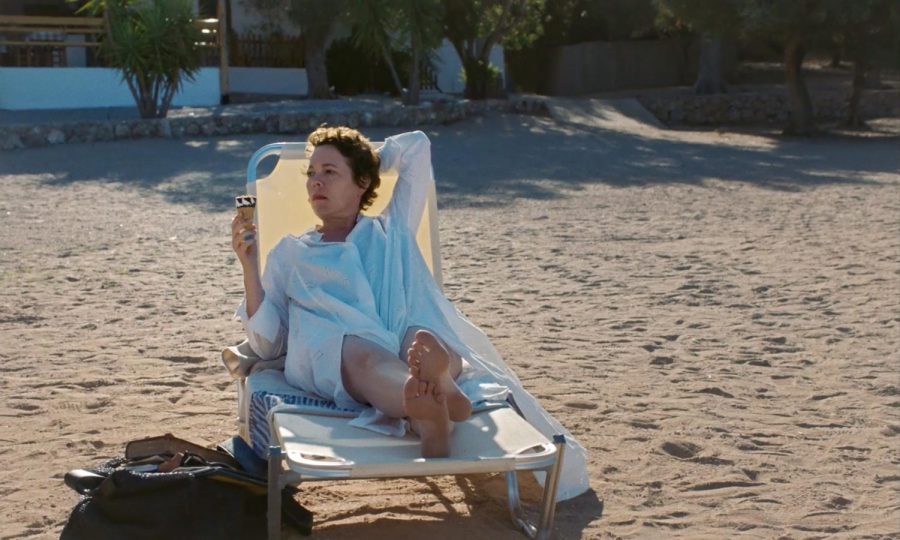Five movies to watch if you wanted more from ‘The Lost Daughter’
Maggie Gyllenhaal’s “The Lost Daughter,” starring Olivia Coleman and Dakota Johnson, explores young motherhood and its impact on identity. Here are some movies that do that better.
“The Lost Daughter,” a psychological thriller, is Maggie Gyllenhaal’s directorial debut. It is available to stream on Netflix. (Image courtesy of Netflix)
February 9, 2022
Maggie Gyllenhaal’s captivating first feature as a director, “The Lost Daughter,” follows Leda (Olivia Coleman), a gifted academic with a mysterious past who becomes obsessed with young mother Nina (Dakota Johnson) while on a beach vacation on the Greek islands.
Despite the implied charm of the remote island, which recalls films like “Mamma Mia,” Gyllenhaal’s seductive cinematography and dreamlike sequences cultivate a much eerier atmosphere. The film opens with a shaky close-up shot of Leda walking on the beach, foghorn blaring and waves crashing. After she collapses onto the rocks seconds later, a lively blues track marks the transition into a shot of Leda driving before she meets her charming beach rental’s caretaker, Lyle (Ed Harris).
The film is relatively predictable stylistically, alternating between flashbacks of Leda as an overwhelmed young mother (Jessie Buckley), scenes with her two young daughters, and scenes depicting her as a somewhat embittered academic on a solo vacation. At the same time, it features incredibly thoughtful and nuanced performances by its primarily woman-led cast, resulting in heart-wrenching, uncomfortable character studies.
“The Lost Daughter” is a portrait of motherhood without any of the idealism typically associated with it. Instead, it reveals the burden of parenting and its detrimental impact on self-identity, particularly for women. In an especially harrowing scene, Nina tearfully asks when “it” — the indescribable, unnamable weight of motherhood — will pass, to which Leda replies that it doesn’t.
“The Lost Daughter” is an incredible example of empathizing with rather than condemning the unlikable, imperfect mother. It’s certainly not the first film to do this, nor the most successful, but its sensitive treatment of the subject warrants an open-minded viewing.
That being said, “The Lost Daughter” constantly felt like it was missing something, as if there were something more Gyllenhaal could’ve done or included to complete what otherwise feels like an unfinished portrait. The most obvious contributing factor is the film’s ambiguous ending, but its use of flashbacks to address the root of Leda’s maternal flaws also proves inadequate in successfully unpacking the convoluted themes the film attempts to confront.
The following five films, on the other hand, utilize more developed filmic dexterity to approach similar themes and unique character studies, in turn filling some of the gaps of “The Lost Daughter.”
“Mommy” (2014)
Xavier Dolan’s “Mommy” (2014) follows single mother Diane (Anne Dorval) and troubled son Steve (Antoine Olivier Pilon) as they attempt to navigate their own complex relationship and respective roles with the help of peculiar neighbor Kyla (Suzanne Clément). As a portrait of unconventional relationships and forced bonding — the aspect ratio of the film itself reflects the upright position of a vertical photo — Dolan’s unique coming-of-age story is incredibly acted and incomparably shocking. Dolan makes moments of unexpected violence and vicious anger almost comedic, illustrating the enduring, underlying love between mother and son and how sometimes it still isn’t enough.
“Lady Bird” (2017)
Like many films about motherhood, Greta Gerwig’s “Lady Bird” (2017) forces viewers to grapple with the fact that mothers are real people, sacrificing their own identities and personal desires in order to best fulfill the role of caregiver. This might seem obvious, but seeing Lady Bird’s mother (Laurie Metcalf) in a work setting with a patient, for example, is like seeing a teacher outside of the classroom for the first time. As selfish as it may be, it’s difficult to imagine that moms have lives outside of the one you’re a part of. Gerwig’s love letter to her hometown of Sacramento and the arduous teenage experience she draws upon combine familiar coming-of-age tropes with remarkable insights into parenting, class and the uncertainty of the future.
“Relic” (2020)
Motherhood has always been a distinctive horror sub-genre, and few films have done it as well as Natalie Erika James’ “Relic” (2020). The film follows Kay (Emily Mortimer) and her daughter Sam (Bella Heathcote) as they search for family matriarch Edna (Robyn Nevin), who has recently gone missing. Disguised as a typical jumpscare genre film, “Relic” is anything but, instead proving to be an incredible allegory for dementia. With a level of nuance rare in horror films, the three generations of actresses expertly delve into their roles, exploring not one but several versions of the archetypal mother-daughter relationship and its progression over time.
“Room” (2015)
The film that won Brie Larson the Oscar for Best Actress, Lenny Abrahamson’s “Room” (2015) follows a nameless woman and her 5-year-old son, Jack (Jacob Tremblay), held in captivity for seven years. The film’s protagonist, who is known only as “Ma,” emphasizes the idea of motherhood as a singular identity, despite it having been only a fraction of her life. The cramped garden shed in which much of the film takes place reflects the suffocating nature of motherhood that is further explored after the two are finally able to escape. Larson’s character is forced to assimilate back into a life she had only ever experienced childless, and the film becomes a heartbreaking exploration of post-traumatic stress disorder. The film’s emphasis on Ma’s hesitancy as a mother at no point contradicts the tender love and attention she shows Jack despite their difficult circumstances — instead, it strengthens it.
“Parallel Mothers” (2021)
A more recent release, Pedro Almodóvar’s “Parallel Mothers” (2021) features two women, one middle-aged and one young — Janis (Penélope Cruz) and Ana (Milena Smit), respectively — as they form an unexpected bond and confront motherhood with conflicting perspectives and intricately intertwined lives. The film merges generational female trauma with important Spanish historical and social contexts, formulating an incredibly tender, complex study of single mothers and female friendships.
At one point in “The Lost Daughter,” Leda describes herself as an “unnatural mother.” Gyllenhaal’s film and those like it celebrate regular, uncertain mothers, exploring the complexities of motherhood without condemning the “imperfect” woman. It’s uncommon to see an unlikable female protagonist in film, particularly as a conduit for analyzing how motherhood impacts identity.
Instead of suggesting that having a child solidifies the identity of “mother,” these films investigate motherhood as a learned relationship between mother and child rather than some abstract maternal instinct.
“The Lost Daughter,” “Mommy,” “Lady Bird,” “Relic,” and “Room” are available on at least one of several streaming platforms. “Parallel Mothers” is currently playing at select theaters.
Contact Lorena Campes at [email protected].

























































































































































